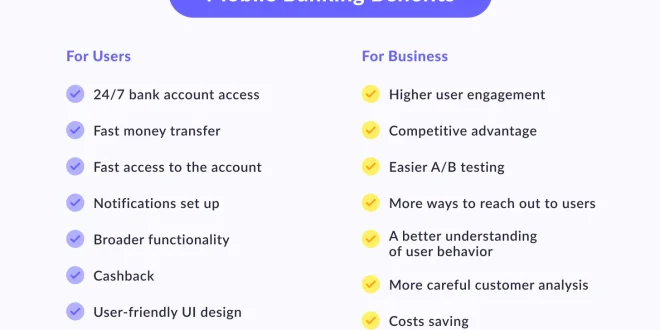In situations where ease of use and accessibility are crucial, mobile banking has become a widely accepted option for handling financial transactions. Users of mobile devices can carry out a variety of banking tasks whenever and wherever they are with a few simple touches.
Nevertheless, mobile internet banking has pros and cons of its own, just like any other technological advancement. We will examine the advantages and disadvantages of mobile banking in this post, highlighting both its possible advantages and disadvantages.
Benefits of Mobile Banking Convenience
Convenience
Users can access their bank accounts via mobile apps or mobile web browsers, making mobile banking incredibly convenient. Customers no longer need to visit a physical branch because they may conduct a variety of financial transactions whenever they want thanks to this technology at their fingertips.
Accessibility
This is one of the main benefits of mobile banking. Users can easily check their account balance, transfer funds, pay bills, and carry out a variety of other tasks as long as they have an internet connection. People now have more control over their financial activities and may manage their funds while on the road thanks to this accessibility.
Time-saving
Long forms and standing in line are no longer necessary with mobile banking. Users of smartphones can complete financial transactions rapidly and efficiently, saving valuable time, with just a few touches. Mobile banking makes the process of paying utility bills or transferring money to another account more streamlined, convenient, and efficient.
Enhanced security
To safeguard users’ financial information, mobile banking apps include strong security features like encryption and multi-factor authentication. These security measures aid in preventing unwanted access and guaranteeing the confidentiality and integrity of transactions. In addition, a lot of banks provide customers with real-time alerts regarding account activity, enabling them to quickly check their bank accounts for any unusual or fraudulent transactions.
Extra attributes and offerings
Numerous more features and services that are available with mobile banking improve the whole banking experience. In order to keep an eye on their financial objectives, users can apply for loans, set up automatic bill payments, deposit checks using cellphones, and even use financial analysis tools. With these new features, consumers have access to an extensive toolkit for efficient money management.
The drawbacks of using mobile banking
Technology dependence
Smartphones and internet access are key components of mobile banking. Should users experience malfunctions or lack a reliable internet connection, it may be more difficult for them to conduct business and handle their accounts. A further danger associated with reliance on technology is the possibility of system failures or outages, which could momentarily impair financial services.
Security issues
Despite the fact that mobile banking apps place a high priority on security, hackers could still try to compromise the system. Users could unintentionally download malicious programs that compromise their account information or fall victim to phishing assaults. It is essential that consumers take caution, protect their mobile devices, and avoid sharing private information.
Limited functionality
Despite the extensive services provided by mobile banking, many sophisticated financial tasks might still need to be completed in person at a branch office. Some financial institutions might not offer all of their services via mobile banking; but, for some transactions, clients might need to use conventional banking techniques. This restriction could be a disadvantage for consumers who only use mobile platforms to get full banking services.
Connectivity and compatibility
Since mobile banking depends on a dependable internet connection, it may be difficult to complete transactions in places with spotty or nonexistent coverage. Furthermore, some mobile banking apps may not work properly on older mobile devices, which would prevent them from using all of the functions.
Extra fees
Some banks could charge extra for particular mobile banking services, like accelerated transactions or particular account activity. Customers should read the terms and conditions of their financial service carefully and be aware of these possible fees in order to prevent any unforeseen expenses.
Concluding the Benefits and Drawbacks of Mobile Banking
The way people manage their finances has been completely transformed by online banking for remote workers, which offers advantages including time savings, accessibility, and ease. Users may easily keep track of their financial activity when they have access to a variety of banking transactions at their fingertips.
Users can utilize mobile banking to manage their finances efficiently and take the required safety measures to protect their funds by being aware of the benefits and drawbacks of this digital banking tool. If you’re looking for a seamless mobile banking app, JS Bank’s app is the best for all your financial needs.
 Diverse Perspectives: Insights & Stories Exploring Ideas, Sharing Knowledge
Diverse Perspectives: Insights & Stories Exploring Ideas, Sharing Knowledge





